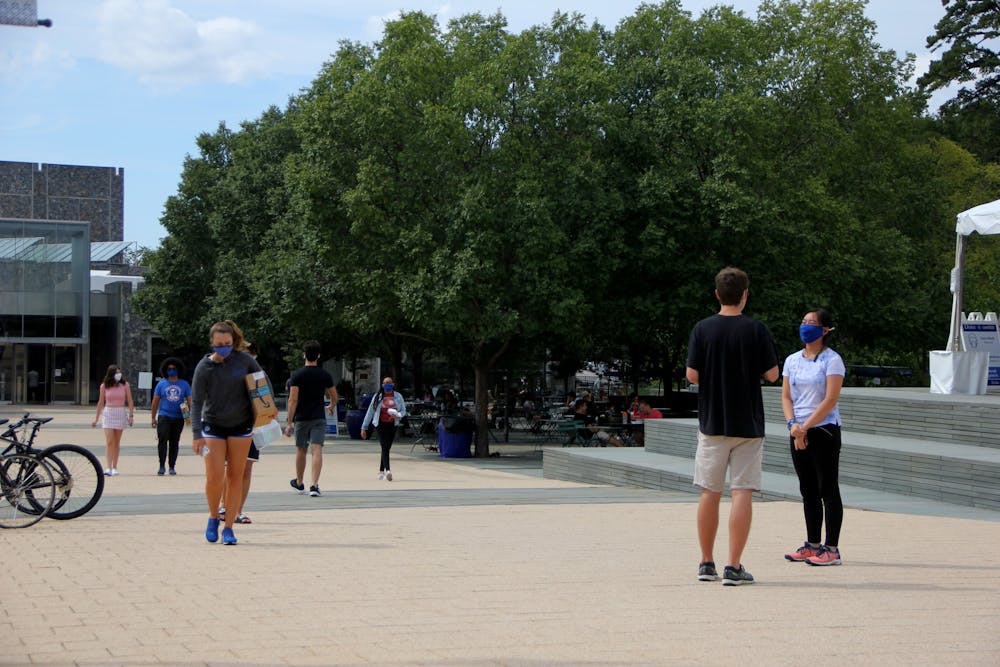The Duke Student Government Senate passed a resolution on Wednesday calling on administrators to better enforce COVID-19 policies, in addition to hearing from the dean of Pratt about his aspirations for the engineering school.
The resolution “urges administration to consistently hold egregious offenders accountable—particularly from a Conduct and Community Standards perspective—to curtail another rise in COVID-19 cases, as promised when the Duke Compact was created at the end of summer 2020.”
Possible consequences for students violating the Duke Compact could include the revocation of campus and academic privileges, suspension or expulsion, according to the resolution.
DSG also requested that the Office of Student Conduct and Community Standards inform students about “potential super-spreader events by releasing conduct updates every two weeks with the demographics of new cases.” Demographics would include level of offense, students’ class year and the event’s physical location.
The resolution, passed at the Senate's weekly meeting, comes just days after the end of Duke’s stay-in-place order, which was implemented following a spike in undergraduate COVID-19 cases. University administrators connected the increase in cases to in-person rush events held by members of the Durham Interfraternity Council, which has promised new accountability measures of its own in the wake of the spike.
Jeanna McCullers, director of the Office of Student Conduct and Community Standards, wrote in an email that students who violate COVID-19 rules will face consequences.
"We appreciate DSG’s endorsement of what had been our clear policy and practice from the start of the academic year: all students are expected to adhere to the Duke Compact, and anyone who is found responsible for violating our shared commitment to health and safety will be held accountable," wrote McCullers, who is also senior associate dean of students. "To be clear, the vast majority of Duke students have taken this pledge seriously and deserve to be recognized, thanked and celebrated."
The future of Pratt
Ravi Bellamkonda, Vinik dean of the Pratt School of Engineering, spoke to senators about his aspirations for Pratt and DSG’s role in supporting Pratt students.
Bellamkonda’s goal at Duke has been to reimagine the undergraduate experience for Pratt students by “flipping the curriculum.” He wanted to grant first-years “an experience that is more true of an engineer…which is to work with a team that you didn’t pick, work on a meaningful problem and see if you can make progress,” he said. This led to the creation of EGR 101L, Engineering Design and Communication.
“What Duke has to offer should include what you would like to do in your first job,” Bellamkonda said. “But I would like the Duke curriculum to make you successful in your fourth job, not just your first.” The difference between a first and fourth job is that the latter requires leadership and entrepreneurial skills, he explained.
Bellamkonda also hopes that Duke faculty members encourage students to rethink their definitions of success, which he believes are currently around professional achievements.
“I would love for our students to really think of success in the units of who they want to be when they’re 50, 60, or 70, as a person,” he said. “And if you have some notion of the kind of person you want to be, which includes being successful professionally, then you would use your Duke time in a way that is wise, that also speaks to making the probability of success in life more probable.”
Bellamkonda said DSG’s current most important responsibility is helping foster community among students.
“The most desired state would be, and as idealistic as this sounds, that all of Duke roots for the success of each of us,” he said, urging senators to consider what work has to be done to make this a reality.
Bellamkonda is leaving Duke in June to become provost and executive vice president at Emory University. Senior Tommy Hessel, president of DSG, asked Bellamkonda what advice he would give to the next dean.
“I hope they will see what I saw quickly, that Duke is a very special place,” he answered. “In my experience, it’s an easy place to fall in love with, and it’s a very hard place to leave.”
But Bellamkonda explained that Duke’s abundance of success doesn’t equate to an absence of shortcomings. He pointed out that efforts to incorporate a more diverse faculty, in regards to race, intellectual leanings and political leanings, are just beginning.
“You constantly need to be thinking about how to make the Duke experience better,” he said, “because we owe it to the youth to do our best to do that.”
In other business
Get The Chronicle straight to your inbox
Sign up for our weekly newsletter. Cancel at any time.
DSG recognized the Duke Boomwhackers Club, which aims to “foster a love of music among Duke students through Boomwhackers.” It also chartered student groups Roundnet Club, which promotes the sport of Spikeball, and Technify, an organization that connects “students with non-profit organizations and social enterprises through pro bono tech projects.”
Senators approved a $1,500 funding request from Juhood Magazine to host speakers at their Environmentalism in Middle East and North Africa panel.
The Senate tabled budgetary statute of $500 to fund a Duke Applied Machine Learning engineer to create a lost and found app, after discussion of alternate platforms.
The Senate approved a revised DSG constitution after a second reading and conducted a first reading of revised Latinx caucus bylaws.

Milla Surjadi is a Trinity junior and a diversity, equity and inclusion coordinator of The Chronicle's 119th volume. She was previously editor-in-chief for Volume 118.

